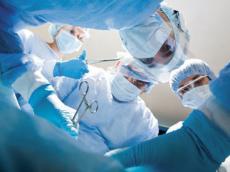|
|
TODAY.AZ / Weird / Interesting
Few patients wake up from surgery - research
16 March 2013 [14:22] - TODAY.AZ
 The risk of waking from a general anaesthetic while under the surgeon's knife is extremely small - about one in 15,000 - research reveals.
The risk of waking from a general anaesthetic while under the surgeon's knife is extremely small - about one in 15,000 - research reveals.Investigators surveyed 82% of the UK's consultant anaesthetists - 7,125 in all - asking them to report any cases of accidental awareness in the past year.
Out of nearly 3 million operations in 2011 there were 153 reported cases.
Most of these patients either came round too soon from general anaesthetic or took too long to go under.
A third - 46 in total - were conscious throughout the operation.
According to the anaesthetists, very few patients suffered any pain or distress as a result of the experience.
The researchers from the Royal College of Anaesthetists and the Association of Anaesthetists of Great Britain and Ireland say their preliminary findings, published in the journal Anaesthesia, should be reassuring for patients.
Prof Tim Cook, co-author of the study and a consultant anaesthetist in Bath, said: "Most of the cases involved the patient being aware during induction when they are being sent off to sleep or after the operation itself has finished.
"They might feel some awareness of tugging or hear some noises.
"Few anaesthetists that we surveyed said their patients complained of pain or distress or made a formal complaint."
Prof Cook said it was a fine balance trying to ensure that a patient was suitably sedated.
"You want to make sure that they are under but you don't want to give them too much because that is dangerous in itself."
Some hospitals have specific monitors for measuring the depth of anaesthesia.
Prof Cook and his team found even when this kit was available, it was not often used - only 2% of the anaesthetists they surveyed said they routinely used brain monitoring technology.
Prof Cook says it is possible that accidental awareness is more common than his study findings suggest. Smaller surveys of patients have revealed higher rates - of as much as one in every 500 operations done under general anaesthetic.
He says anaesthetists want to learn more about accidental awareness so they can avoid more patients experiencing it.
"We are spending the next year studying as many of the cases as possible to learn more from patients' experiences. Then we will be able to offer new insights and guidance."
Theirs is thought to be the largest study of its kind.
/BBC/
URL: http://www.today.az/news/interesting/120424.html
 Print version
Print version
Views: 1882
Connect with us. Get latest news and updates.
See Also
- 19 February 2025 [22:20]
Visa and Mastercard can return to Russia, but with restrictions - 05 February 2025 [19:41]
Japan plans to negotiate with Trump to increase LNG imports from United States - 23 January 2025 [23:20]
Dubai once again named cleanest city in the world - 06 December 2024 [22:20]
Are scented candles harmful to health? - 23 November 2024 [14:11]
Magnitude 4.5 earthquake hits Azerbaijan's Lachin - 20 November 2024 [23:30]
Launch vehicle with prototype of Starship made its sixth test flight - 27 October 2024 [09:00]
Fuel prices expected to rise in Sweden - 24 October 2024 [19:14]
Turkiye strikes terror targets in Iraq and Syria - 23 October 2024 [23:46]
Kazakhstan supplied almost entire volume of oil planned for 2024 to Germany in 9 months - 23 October 2024 [22:17]
Taiwan reported passage of Chinese Navy aircraft carrier near island
Most Popular
 100 million is wasted: who pays for the fake history of the South Caucasus
100 million is wasted: who pays for the fake history of the South Caucasus
 New free trade accord reached between India and New Zealand
New free trade accord reached between India and New Zealand
 "Garegin's days are numbered" is another reminder warning to the Armenian Catholicos
"Garegin's days are numbered" is another reminder warning to the Armenian Catholicos
 Opening of regional communications: equating to TRIPP
Opening of regional communications: equating to TRIPP
 Azerbaijan’s FM honors Colombian Ambassador as he concludes mission
Azerbaijan’s FM honors Colombian Ambassador as he concludes mission
 Final statements delivered in trial of Armenian citizens at Baku Military Court
Final statements delivered in trial of Armenian citizens at Baku Military Court
 Presentation of 'Asaf Zeynalli Selected Works' held online from Australia
Presentation of 'Asaf Zeynalli Selected Works' held online from Australia
